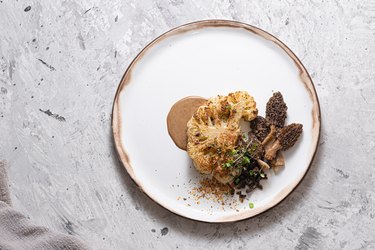
Common throughout much of the Northern Hemisphere, morel mushrooms (Morchella spp.) grow in many parts of the United States, including the state of Alabama. While they are considered a culinary delicacy because of their flavor and texture, morel mushrooms have proven very difficult to cultivate. Therefore, foraging for morels is a popular activity for mushroom connoisseurs.
Morel Mushroom Identification
Video of the Day
Morel mushrooms can be identified by their cone-shaped heads, which are covered in deep indentations said to be reminiscent of honeycomb or a human brain. The most common morel mushrooms are yellow or black in color, though there are gray morels too. Wild morel mushrooms may range in size from 2 to 8 inches. The stem and cap of a morel mushroom are hollow when sliced open.
Video of the Day
While other types of mushrooms are grown commercially, morel mushrooms are not easily cultivated. If you are lucky enough to find morel mushrooms in the wild, note that even though they are edible, they should be thoroughly cooked before they are served, as consuming them raw or undercooked can lead to an upset stomach. Morels should be consumed within a couple of days of being picked, or they can be dried and preserved for cooking later on.
Where Do Morel Mushrooms Grow?
Wild morel mushrooms can be found all over the world, but they are most common in the Northern Hemisphere. Somewhere between 30 and 60 different morel species have been identified in the United States. These mushrooms need humid conditions to grow and therefore emerge after spring rains. Soil temperatures around 55 degrees Fahrenheit are conducive to morel mushroom growth.
Mushrooms can pop up in a variety of environments, but they are especially common around decaying trees that feed their growth and areas that have been disturbed or affected by forest fires. Morel mushrooms also tend to occur in south-facing slopes that are exposed to the sun, which is also critical to mushroom growth. These mushrooms may grow alone or in groups. To harvest a morel mushroom, it is best to cut it off at the soil line, leaving the base of the mushroom behind in the ground.
Morel Mushrooms in Alabama
Morel mushroom hunting season is usually short and at the mercy of weather conditions. In Alabama, the first morels usually crop up in early March and continue to emerge throughout the month. Wooded areas are good places to look for morels. The further north you go in Alabama, the better the odds of finding morel mushrooms, which are rare beyond the frost line.
A number of other edible mushrooms grow in the wild in Alabama, including chanterelles (Cantharellus spp.) and parasol mushrooms (Macrolepiota procera). It is critical to identify any wild mushrooms before consuming them, as some of them are poisonous, and consuming them can lead to illness or even death. One type of mushroom you want to avoid is the so-called "false morel" in the genus Gyromitra, which is extremely toxic and can be distinguished from true morels by their wrinkled heads. An up-to-date field guide can help you ensure that the Alabama mushrooms you are picking are safe for consumption.
- Alabama Cooperative Extension Service: Hunting Mushrooms - the Morel of the Story
- Alabama Mushroom Society: Morchella, The Morels
- University of Minnesota Extension: Harvesting Morel Mushrooms
- Oklahoma State University Extension: Spring Highlights Morel Mushroom Hunting
- Alabama Mushroom Society: Common Edible Mushrooms of Alabama